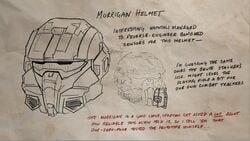MORRIGAN-class Mjolnir: Difference between revisions
From Halopedia, the Halo wiki
mNo edit summary |
|||
| Line 45: | Line 45: | ||
==Production notes== | ==Production notes== | ||
The Morrigan helmet design is based on illustrations done by [[Gabriel Garza]] during the concept phases for ''[[Halo 5: Guardians]]''. The images in question were done as part of concept explorations for the design of Frederic-104 and his [[CENTURION-class Mjolnir]], though ultimately went unused. | The Morrigan helmet design is based on illustrations done by [[Gabriel Garza]] during the concept phases for ''[[Halo 5: Guardians]]''. The images in question were done as part of concept explorations for the design of Frederic-104 and his [[CENTURION-class Mjolnir]], though ultimately went unused. Frederoc-104's involvement with the MORRIGAN prototypes is a likely reference to his concept art being the inspiration behind the MORRIGAN-class Mjolnir. | ||
==Gallery== | ==Gallery== | ||
Revision as of 04:31, July 16, 2022
| Morrigan | |
|---|---|
| Production overview | |
|
Manufacturer(s): |
|
|
Type: |
|
The MORRIGAN-class Mjolnir is a variant of the MJOLNIR Powered Assault Armor.[2]
Overview
Design details
The Morrigan helmet was developed based on sensors used by Jiralhanae Stalkers and recovered by Banished raiding parties—similarly to the STALKER-class Mjolnir. The upgrades are considered surprisingly intuitive and efficient by Spartan Operations personnel able to employ them.[2][1] The helmet is capable of mounting a MOD-P CBRN module to maximize its endurance and efficacy in various atmospheric conditions, or to aid Spartans in tracking specific biochemical signatures.[3]
Development history
The Morrigan helmet is manufactured by Naphtali Contractor Corporation.[1][2] During the helmet's prototyping phase, it was tested by Spartan-II Frederic-104.[1]
In-game information
Halo Infinite
The Morrigan helmet, along with one attachment, is available for multiplayer Spartan armor customization on the Rakshasa armor core in Halo Infinite.
| Helmet | Manufacturer | Lore | Rarity | Unlock Requirements |
|---|---|---|---|---|
Morrigan |
Naphtali Contractor Corporation | MORRIGAN helmets use the latest reverse-engineered Jiralhanae stalker sensors captured from Banished raiders. The upgrades are welcomed by Spartan combat trackers, who find the alien systems surprisingly intuitive and highly efficient. | Rare | Season 02: Lone Wolves |
MOD-P CBRN |
Naphtali Contractor Corporation | Filter packs and air conditioning modules in the Morrigan can be swapped out to maximize their endurance and efficacy in specific atmospheric conditions, or to key in on specific biochemical traces. | Epic | Season 02: Lone Wolves |
Production notes
The Morrigan helmet design is based on illustrations done by Gabriel Garza during the concept phases for Halo 5: Guardians. The images in question were done as part of concept explorations for the design of Frederic-104 and his CENTURION-class Mjolnir, though ultimately went unused. Frederoc-104's involvement with the MORRIGAN prototypes is a likely reference to his concept art being the inspiration behind the MORRIGAN-class Mjolnir.
Gallery

|
Browse more images in this article's gallery page. |
Concept art
List of appearances
- Halo Infinite
- Season 02: Lone Wolves (First appearance)
Sources
- ^ a b c d Twitter, Halo - "Alpha Pack brings a free new event pass with additional cosmetics for your RAKSHASA armor core. Spartan Sigrid Eklund is passing on her field notes to you about some of these items, starting with the MORRIGAN helmet." (Retrieved on Jul 29, 2021) [archive]
- ^ a b c d Halo Infinite, Armor Hall: MORRIGAN helmets use the latest reverse-engineered Jiralhanae stalker sensors captured from Banished raiders. The upgrades are welcomed by Spartan combat trackers, who find the alien systems surprisingly intuitive and highly efficient.
- ^ Halo Infinite, Armor Hall: Filter packs and air conditioning modules in the Morrigan can be swapped out to maximize their endurance and efficacy in specific atmospheric conditions, or to key in on specific biochemical traces.



